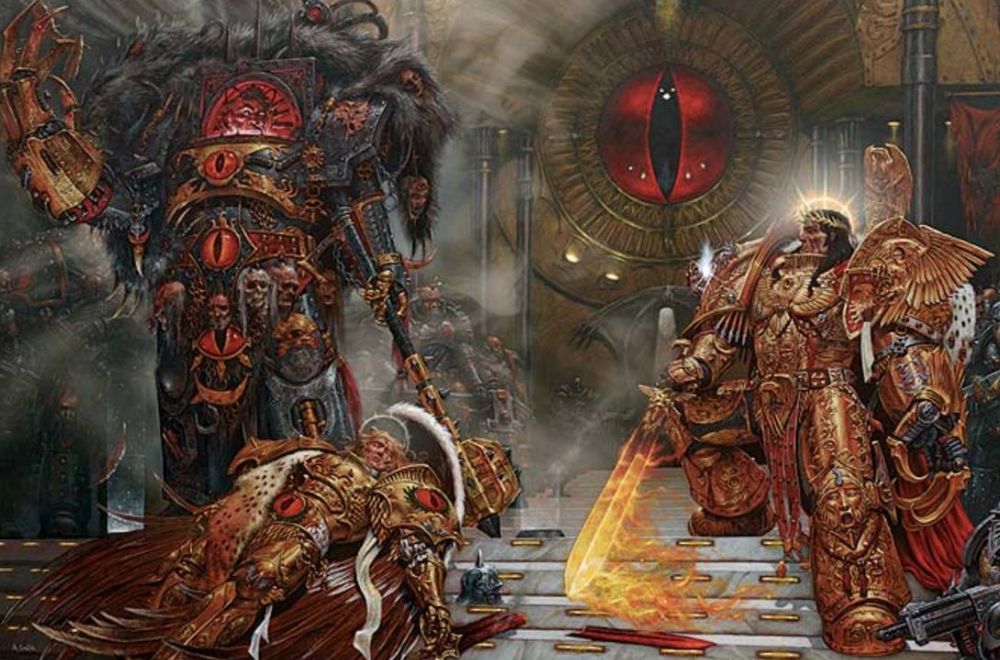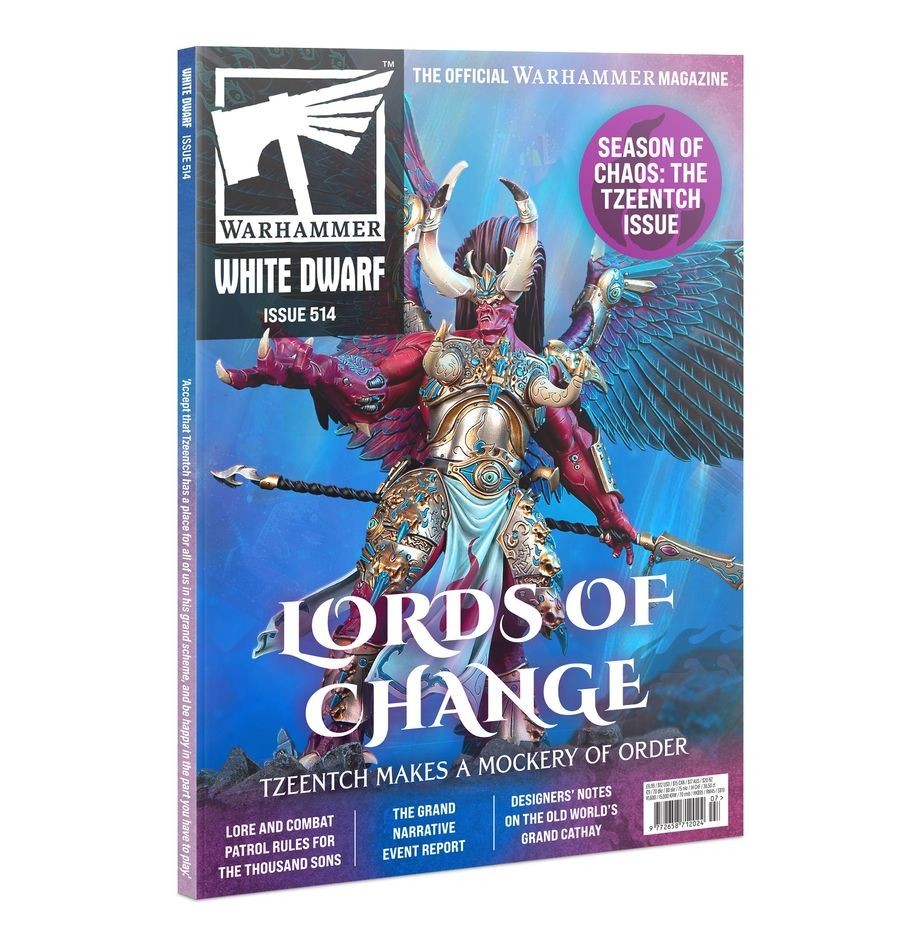HERESY WARNING:
The following article explores a controversial and unpopular perspective on the Emperor of Mankind. Reader discretion is advised, and any inquisitors reading this are encouraged to skip ahead.
The Emperor of Mankind is often heralded as the savior of humanity, the visionary behind the Imperium, and the ultimate beacon of light in the grim darkness of the 41st millennium. But beneath the gilded myth lies a series of actions and decisions that reveal significant flaws in his leadership, his parenting of the Primarchs, and his overall ability to rule.
Let’s explore why the Emperor, for all his grandeur, might not be the paragon he is often painted as.
A Failure as a ‘Father’
The Emperor’s greatest experiment was the creation of the Primarchs, intended to be perfect generals, rulers, and leaders. Yet, his handling of his “sons” was riddled with negligence, poor judgment, and outright cruelty.
- Angron: A Heartless Abandonment: When the Emperor discovered Angron leading a rebellion alongside his fellow gladiatorial slaves, he forcibly teleported Angron aboard his ship rather than aiding his cause. This callous act left Angron's comrades to be slaughtered and solidified the Primarch’s resentment. Angron’s bitterness and eventual fall to Khorne were born from the Emperor's refusal to offer compassion or understanding.
- Lorgar: Punished for Worship: Lorgar’s obsession with faith and devotion could have been redirected or nurtured. Instead, the Emperor chose to publicly humiliate him by ordering the Ultramarines to burn Monarchia, a city Lorgar had lovingly crafted in the Emperor’s honor. This action not only shattered Lorgar’s faith but also drove him into the arms of Chaos, where he found solace in the Ruinous Powers.
- Perturabo: Exploited Without Reward: The Iron Warriors, under Perturabo, were relentlessly assigned to thankless siege campaigns, earning little recognition for their sacrifices. The Emperor's disregard for Perturabo’s mental and emotional toll pushed the Primarch toward bitterness, envy, and ultimately, rebellion.
- Konrad Curze: Ignored Warnings of Madness: The Emperor chose to ignore Konrad Curze’s prophetic visions and violent tendencies, leaving the Night Haunter to spiral into madness and atrocity. Had the Emperor addressed Curze’s mental state earlier, the Night Lords’ fall to Chaos might have been prevented.
- Mortarion: A Poisonous Relationship: The Emperor imposed his will on Mortarion by killing his foster father and taking credit for liberating the people of Barbarus. This act undermined Mortarion’s sense of agency and sowed seeds of resentment that would later lead him to Nurgle.
- Horus: The Favored Son Betrayed: The Emperor’s favoritism toward Horus created jealousy among the other Primarchs. When Horus began to fall under Chaos’ influence, the Emperor failed to recognize or address the signs, ultimately resulting in the Horus Heresy—a galaxy-wide civil war.
Failure as a Leader
The Emperor’s leadership style was often marked by arrogance, secrecy, and a disregard for the needs of those he ruled.
- Burning Monarchia: The destruction of Monarchia wasn’t just a blow to Lorgar - it was a symbolic message to the Imperium that obedience was valued above all else. Rather than addressing Lorgar’s tendencies constructively, the Emperor used a show of force that sowed distrust and resentment.
- The Great Crusade’s Flawed Vision: The Emperor’s insistence on a purely secular Imperium ignored humanity’s natural inclination toward faith. By outlawing religion and suppressing spiritual belief, he created a vacuum that Chaos eagerly filled. This shortsightedness laid the groundwork for widespread corruption and rebellion.
- Ignoring the Council of Nikaea: At the Council of Nikaea, the Emperor issued the Edict of Nikaea, banning the use of psychic powers by the Astartes and disbanding the Librarius departments, with a stern warning directed at Magnus the Red. Although the Emperor refrained from openly accusing Magnus of sorcery, he viewed his son’s actions as a personal betrayal and warned of devastating consequences for defiance. While Magnus bowed and pledged obedience, the proclamation drove a deep rift between father and son, ultimately setting the stage for Magnus’ fall to Tzeentch and the destruction of Prospero, a pivotal moment in the lead-up to the Horus Heresy.
- The Webway Project’s Secret: The Emperor’s decision to keep the Webway project a secret from his sons and the Imperium created unnecessary confusion and distrust. Had he shared his vision, it’s possible that his sons might have rallied behind him instead of splintering into factions.
Failure as a General
The Emperor’s strategic and tactical decisions were often overshadowed by hubris and an inability to see the larger picture.
- The Betrayal of the Primarchs: The scattering of the Primarchs by Chaos was a catastrophic blow to the Emperor’s plans. Yet, when the Primarchs were recovered, he failed to establish a strong emotional connection with many of them, treating them more as tools than as sons. This lack of rapport contributed to the widespread disillusionment that fueled the Heresy.
- Abandoning the Great Crusade: The Emperor’s decision to retreat to Terra and focus on the Webway project left his Primarchs feeling abandoned and rudderless. Without his guidance, power struggles, jealousy, and misunderstandings festered among the ranks, paving the way for Horus’ rebellion.
- The Battle of Molech: The Emperor knew that Molech was a key battleground tied to Chaos, yet he failed to fortify it adequately. This oversight allowed Horus to access the same powers that the Emperor had once sought, elevating the Warmaster to a near-godlike status.
The Siege of Terra: During the Siege of Terra, the Emperor remained confined to the Golden Throne, directing the defense in a reactive and detached manner. His final confrontation with Horus, though heroic, came far too late to prevent the catastrophic damage inflicted on the Imperium.
Failure as a Ruler
Even in the broader context of his rule, the Emperor’s decisions were deeply flawed.
- The Secular Imperium: The Emperor’s rejection of religion, despite humanity’s innate need for spiritual connection, was one of his most significant miscalculations. Ironically, the Imperium of the 41st millennium now revolves around his worship as the God-Emperor—an outcome he sought to prevent.
- The Golden Throne: The Emperor’s entrapment on the Golden Throne, sustaining the Astronomican at the cost of his humanity, is a testament to his failure. The Imperium he envisioned has devolved into a dystopian nightmare of fanaticism, bureaucracy, and endless war.
Conclusion
The Emperor’s vision of unity and enlightenment was noble, but his methods were deeply flawed. His inability to connect with his sons, his heavy-handed suppression of faith, and his reliance on others to execute his plans reveal a leader whose failings had catastrophic consequences. The Heresy, the scattering of the Primarchs, and the dystopian state of the Imperium are as much his legacy as any of his triumphs.
While the Emperor’s sacrifices for humanity are undeniable, his failures remind us that even the greatest of beings are fallible. Perhaps the true lesson of the Emperor’s story is not one of divinity but of tragic hubris.
References:
- Codex Imperialis (2nd Edition)
- The Horus Heresy: Betrayal
- The First Heretic by Aaron Dembski-Bowden
- Angel Exterminatus by Graham McNeill
- Helsreach by Aaron Dembski-Bowden
- Perturabo: The Hammer of Olympia by Guy Haley
This is a non-profit article created solely for the Tabletop Gaming community, it is not intended to infringe upon any IP.

Written by @gothicgarnish : – "Revealing the unseen realms." A digital creator-driven project, GothicGarnish focuses on Warhammer, 40k, and beyond, exploring gothic themes and narratives through immersive storytelling and visuals.







